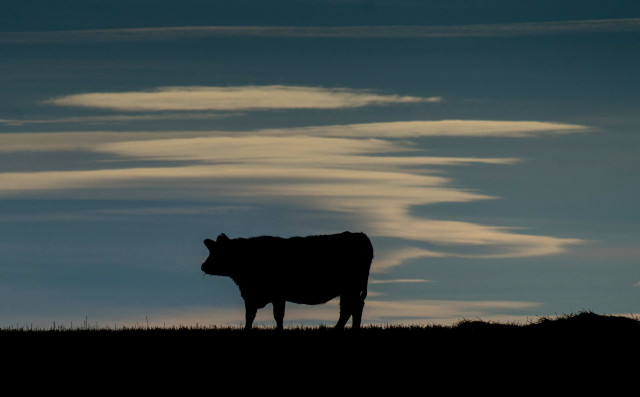France says detected first case of mad cow disease since 2011
The case of BSE was detected in northeastern region of Ardennes, near Belgian border

PHOTO: AFP
The case of BSE was detected in the northeastern region of the Ardennes, near the Belgian border, the ministry said in a statement.
"A suspected case of bovine spongiform encephalopathy (BSE), detected in a five-year-old cow which died prematurely at a cattle farm in Ardennes, was confirmed on March 23 by the European Union reference laboratory," it said.
The announcement comes at a difficult time in France's key farming sector where the beef, pork and milk sectors have seen prices collapse due to falling sales to China and especially a Russian embargo on most Western food imports in retaliation for sanctions over the Ukraine crisis.
Keep calm and carry on: Swine flu is not a major threat, say experts
The crunch in French agriculture has been compounded by a price war with wholesalers and sparked months of angry protests.
The agriculture ministry said that the Ardennes BSE case had been reported to the European Commission and the Paris-based veterinary watchdog, the World Organisation for Animal Health (OIE).
It also sought to reassure consumers. "The detection of this case has no impact for the consumer," it said.
About 100 cattle will be slaughtered within a month, as per the rules in such cases, following the discovery of the BSE case, the ministry said.
The affected cows would be those aged one year older or younger than the infected cow that died and which may have been exposed to the same feeding source, the ministry told AFP.
Five swine flu cases reported so far in 2016
"That makes about 100 cattle" out of the 400 cows of the same breed at the Ardennes farm, for which the breeder will be compensated, it said.
On Tuesday, the ministry had announced a suspected BSE case, picked up in mid-March in a dead cow that had been sent for destruction and therefore not destined for human consumption. The breeder had been informed and his herd put under surveillance as a preventative step.
BSE is a brain-destroying disease among cattle that sparked a scare in the 1990s when it was found it could also be transmitted to humans who ate beef infected with the agent, a rogue protein called a prion.
The epidemic -- of which Britain was the epicentre -- was traced to the use of infected carcasses recycled for animal feed, prompting dozens of countries to strengthen veterinary controls.
The number of cases has plummeted, although isolated occurrences persist, according to a tally by the OIE.
Zika virus mosquitoes found in Pakistan
In 2015, there were single cases in Canada, Ireland, Norway and Slovenia, as well as two cases in Britain, the OIE said on its website Thursday.
Agriculture Minister Stephane Le Foll will ask the European Commission to launch an inquiry to cross-reference details of the cases, the ministry said.
France was classed as a "negligible risk" country for BSE by the OIE in 2015.
The French ministry said it was "probable" that countries which last year reopened their borders to French beef exports -- Saudi Arabia, Canada, Singapore and Vietnam -- would close them again, but that they only represented a small volume of exports.
Other EU member states, which are the main importers of French meat, cannot shut their borders to French exports. This discovery of BSE is "bad news but the direct and real economic consequences will be limited", the ministry said.



















COMMENTS
Comments are moderated and generally will be posted if they are on-topic and not abusive.
For more information, please see our Comments FAQ